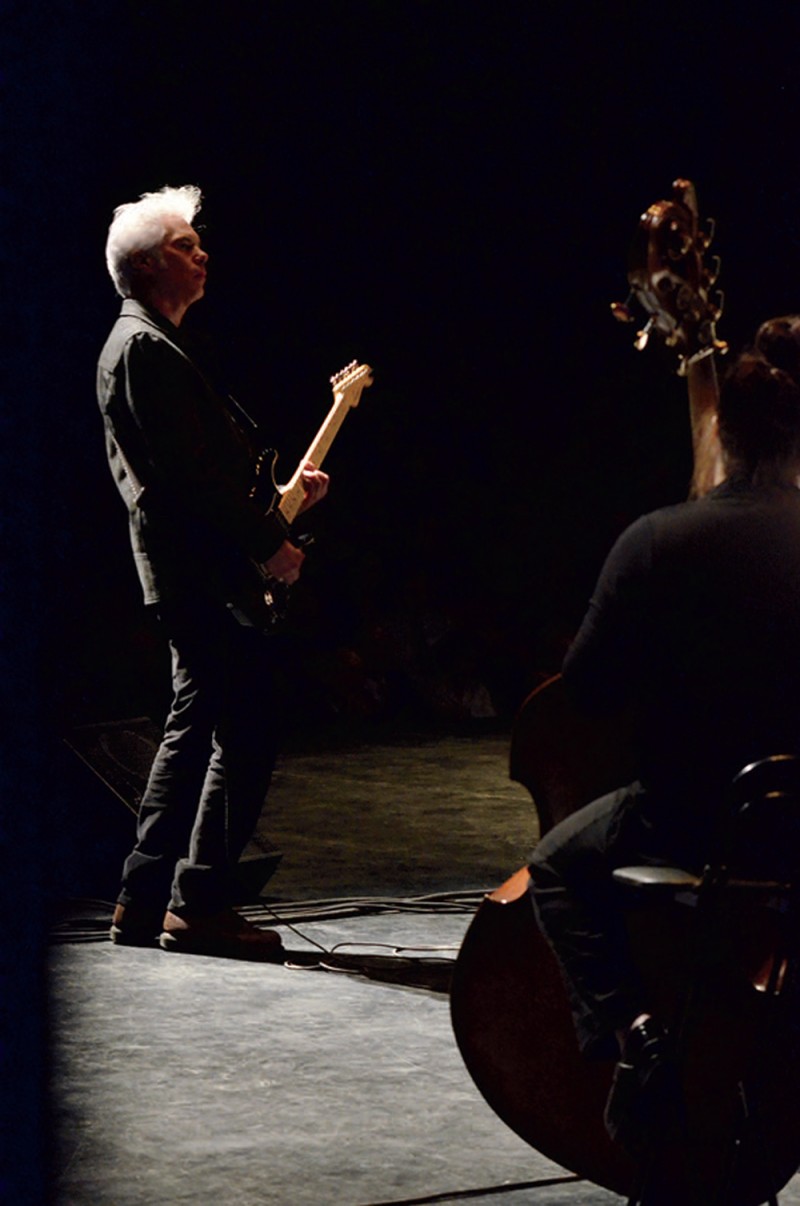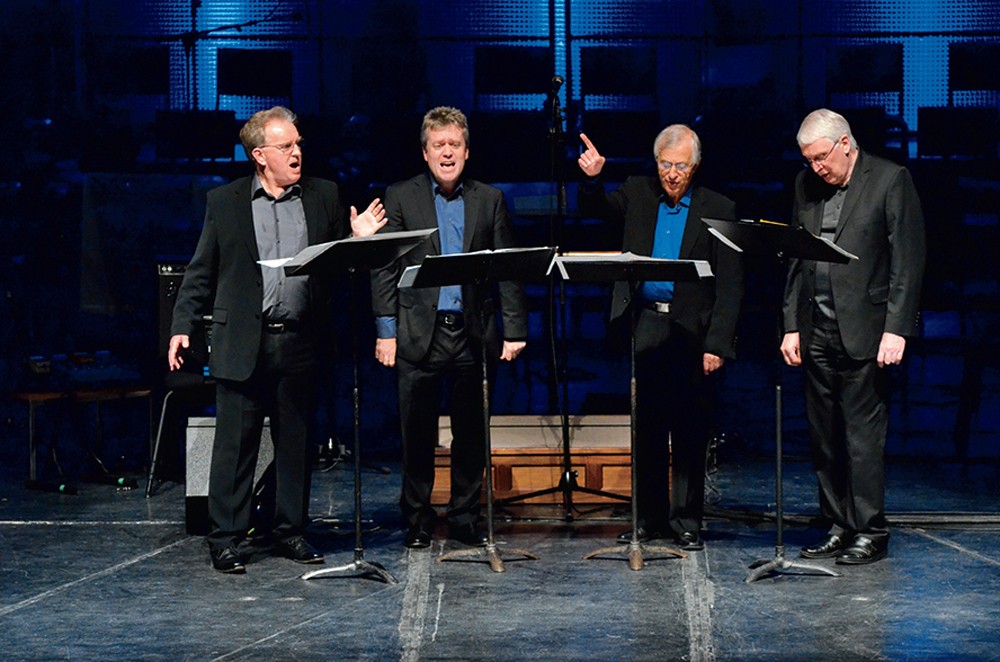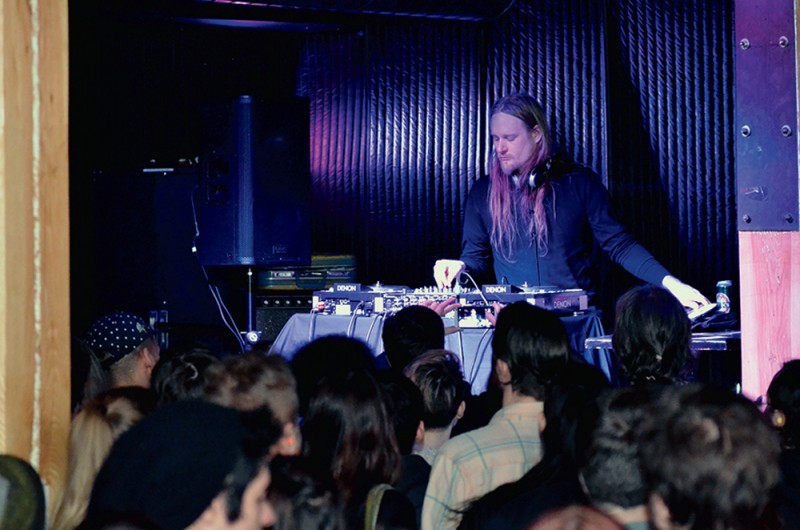Winnipeg Symphony Orchestra
New Music Festival 2014
At last year’s New Music Festival, an annual midwinter event hosted by the Winnipeg Symphony Orchestra, I went to hear Steve Reich’s Tehillim, an almost unbearably moving piece based on the Hebrew Psalms, and one of the four vocalists, understudyless, had lost her voice. Or such was the announcement made at the beginning of the intermission, and then dramatically overturned at the break’s end, which came only after what seemed an eternity in the darkness as we waited in our dejection to hear a substitute piece by a different composer—a situation made worse by the fact that Reich was in the house, and had earlier supervised rehearsals. Yet the show went on, like a miracle, which the performance itself restated. The voice, I was later told, which had proved resistant to both injections and massages and was still wispy and croaking at the cancellation announcement, had returned with unexplainable suddenness.

Jim Jarmusch at Centennial Concert Hall. All images courtesy Winnipeg Symphony Orchestra. Photographs: Chronic Creative.
As declared by its title, “Beyond,” this year’s event, co-curated by festival newcomer Matthew Patton and the WSO’s music director Alexander Mickelthwate, looked to take such phenomena to the level of an explicit courtship. The title, I can report after a week eclectically full of astonishments, delivered in every way.
On opening night, leading Pierre Boulez’s concentrated, intricately operatic Le soleil des eaux, soprano Sarah Kirsch made me wish that I was settling in for cyclic hours of such stuff. Later, the Canadian premiere of Radiohead guitarist Jonny Greenwood’s homage to Krzysztof Penderecki, 48 Responses to Polymorphia, made me hallucinate massive bug swarms, an effect it seemed to have over the orchestra too, for at one point they laid down their bows (later exchanged for shakable, bulkier staffs adorned with zills) and collectively looked up at loge-left, as if anxiously awaiting some giant airborne incursion. For the night’s finale, the Hilliard Ensemble, currently on their farewell tour, returned to their long history with composer Arvo Pärt and performed his Litany for soli, mixed choir and orchestra, giving me conversional goosebumps with their regular, capaciously paced intonings of St. John Chrysostom.

Hilliard Ensemble: David James, countertenor; Rogers Covey-Crump, tenor; Steven Harrold, tenor; Gordon Jones, baritone at Centennial Concert Hall.
The night, however, wasn’t over. Performing in the festival’s “Pop Nuit” sidebar, virtuosic electronic experimentalist “Venetian Snares” (the chief alias of Winnipeg-born Aaron Funk, who looks something like a recently awoken Norse god in Sorels) took to the stage after midnight at Union Sound Hall, a bar down the street from the Concert Hall in the city’s Exchange District. How to describe what “Venetian Snares” generates out of a cluttered tabletop of cord-spitting gear? Whereas generic labels like “breakcore” fail out of laziness, “New Music” does not even begin to go far enough. For the sounds of “VS” anticipate the frequencies of the year 4052, or 6666, or even 666666, after innumerable repetitions of the reliable dialectic of techno-progress and apocalyptic disaster. Throwing back to his classic record, Winnipeg Is a Frozen Shithole, Funk introduced a track called The Tenth Circle of Winnipeg, and then launched into a mosh-pit inducing set of Dadaist samples (“Tell me about my uterus!”) soaring over beats so fast and frenetically ADHD that distraction somehow shaded over into absolute immersion.

Venetian Snares at Union Sound Hall.
The next night featured one of the festival’s biggest curatorial coups: a sneak peak into Jim Jarmusch’s and Phil Kline’s opera-in-progress, Tesla in New York, a piece composed of episodes from the inventor’s time in the city, which, like the current he crucially helped to develop, alternated back and forth, from rags to riches to rags. Beginning with an overture of electric guitar feedback performed by Jarmusch and Kline—a kind of invocatory paean to electricity which Tesla claimed to see every time he petted his cat and was for him the fundamental ingredient of the universe—the performance both enthralled and tantalized. As the parts were sung (affectingly, by the Hilliard Ensemble joined by Jacqueline Horner-Kwiatek) but not acted, I wondered, how will these amazing incidents—the conflagration that engulfed Tesla’s lab, his romance with one of the pigeons whom he would attract into his room at the New Yorker Hotel by leaving food on the windowsill—be translated visually by Jarmusch’s persistently vanguard sense of design and ultra-precise blocking?

Alexander Mickelthwate conducting Tesla in New York at Centennial Concert Hall.
As the week continued, a sort of ephemerally satellite or “little downtown NYC” scene seemed to be sprouting up amongst these latitudes. Added late to the bill, a show at Union Sound Hall featured Sonic Youth’s Lee Ranaldo, who gave his own inspired drone-feedback performance, carving out space in the densely packed bar from which the stage had been removed by radially walking around with a guitar dangling from the ceiling by a cord. Midweek brought the eagerly anticipated arrival of Glenn Branca, whose legendary guitar ensemble included both Kline and Ranaldo in its early incarnations. While introducing the North American premiere of Symphony No.11—one of three Branca works for orchestra featured by the festival—the composer spontaneously squelched himself, and handed over the mic to Mickelthwate, who summed up the piece by telling the audience (and in the act, winning Branca’s smiling approval), “For the next 40 minutes, we’re going to make time stop.” Which was exactly what happened. A menacing, swamp-like, non-developmental, infinitely involuting sound field, the piece convinced me that music can just be at every moment. Pausing doesn’t have to equal silence.
And from there the programme, under Mickelthwate’s vitalizing conductorial care, kept giving: two orchestrally mediated works by “Venetian Snares” with local musicians Andy Rudolph and Dan Ryckman pulling off superhuman feats of live math drumming; Anthony Niiganii of the Pimicikamak Cree Nation playing traditional flute in Mychael Danna’s score for The Ice Storm and bringing me fully back to, and deepening, that movie’s core of quavering loss; the world premiere of composer and engineer Valgeir Sigurðsson’s Eighteen Hundred And Seventy-Five, a drifting, secret-filled dirge about emigration that subliminally incorporates electronics. There was also a performance in a reconverted, early 20th-century, pantheon-like bank by dauntless circular-breathing saxophonist Colin Stetson; pieces by Owen Pallett, Max Richter, Eyvind Kang and Jessika Kenney, and many more. I’d happily lose my voice, and not have it back for a long while, just for the opportunity to keep telling you all about it.
“WSO New Music Festival Beyond” took place in Winnipeg, from January 25 to 31, 2014.
Jonah Corne is an Assistant Professor at the University of Manitoba, where he teaches film studies.

